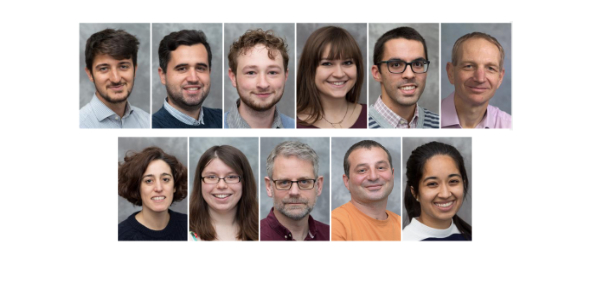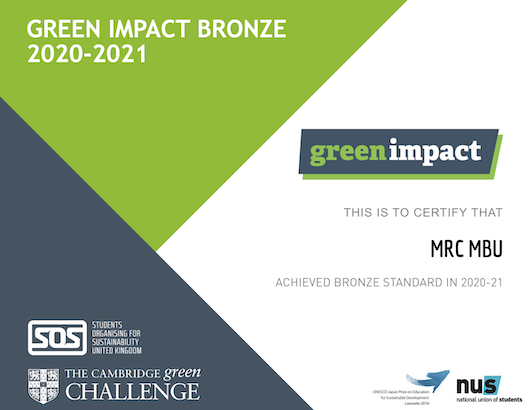Michele and Alannah will edit by 13 August
The Unit is committed to developing more environmentally friendly and economical ways of working. "Green Team" meetings are held every month with representation from across the Unit to develop policy. Please contact Michele Frison if you would like to get involved. This newly formed group is looking in particular at ways to reduce our energy consumption. A summary of the group' s ideas is below courtesy of Martin King. Other Green Team members are Ana Terriente Felix, Iacoppo Bicci, Michele Frison, Olivier Biner, Lisa Tilokani, Anja Gruszcyk, Camilla Cimadamore-Werthein, Pedro Giuomar, Leonor Miller-Fleming, Andrew Raine, David Pate
The University is also committed to reducing its environmental impact. A wide range of information and advice can be found here, a quick guide is in this handout.
Who are we?
Not-so-fun-fact: Laboratories consume nearly 5 times more energy than a typical office space and are often the largest consumers of energy on any given campus or at any given institution. That's why we should try and do as much as we can!
The Green Team is a group of staff, students, and post docs, who work to improve the unit's carbon footprint! We aim to have a representative from each lab, but are always looking for new members regardless! If you are interested in joining us, please email (or find!) one of us.
Members of the team are Michele Frison, Ana Terriente Felix, Iacoppo Bicci, Lisa Tilokani, Anja Gruszcyk, Pedro Giuomar, David Pate, Alannah King, Antony Hynes-Allen, Andrew Raine, and Daniel Grba.
What do we do?
We work to make people aware of environmental issues, and the things that they can do to reduce their carbon footprint. This has included:
- Setting up the Starlab pipette recycling scheme
- Crisp packet recycling (New!)
- Encouraging -80 freezers to be changed to -70
- Encouraging people to turn the lights off when they're not in use
- Encouraging the use of reusable cups over disposable ones, and promoting Fairtrade and local/sustainable food.
- Battery recycling schemes
- Nespresso pod recycling
We'll also be starting a newsletter soon to keep you all up to date with what we're doing, what the university is doing, and how you can get involved!
Green Impact!
On the 7th of June 2021 it was officially confirmed that the MRC MBU has achieved a Bronze Green Impact award for the year 2020-2021! Congrats to everyone involved in this achievement, and thank you to everyone who has done something to improve the unit's carbon footprint! We hope to aim for silver next year!
“It was a pleasure to audit this team, they’ve done fantastic work implementing new sustainability measures across their unit and there’s excellent energy and enthusiasm from the team.” [The auditor] also commended the engagement levels of your new environment committee, your comprehensive new induction materials and signage to enable pro-environmental behaviours across MRC MBU.
Get Involved!
Spotlight On events! Typically, these events and activities focus on themes such as reducing waste and recycling, saving energy, and biodiversity and can include anything from talks and training sessions to litter picks and nature walks.
WARPit is an online marketplace to help redistribute resources legally and conveniently within the University for free. It is designed to make it easy for staff to find others with spare items - reducing procurement spend. It also helps staff who are disposing of “stuff” to find new owners - saving on waste disposal costs. You can sign up here!
Sign up to the Greenlines Sustainability Newsletter!
Sign up to the Travel Newsletter to learn more about sustainable travel.
Ecosia, a free alternative to Google that uses its ad revenue to plant trees! Set it as your default browser and plant trees today!
Also check out the Guide to Green Printing!
Useful Links
The MBU is committed to managing its activities and environmental impacts by a programme of continual improvement in environmental performance and the prevention of pollution.
This programme of improvement involves the development of an environmental management system to be implemented throughout the organisation where it is appropriate to the nature, scale and potential environmental impact of the activities undertaken.
The Unit Director is responsible for the implementation of the environmental policy within and the environmental performance of the Unit.
The Director has appointed the Laboratory and Health & Safety Manager to be an Environmental Officer for the Unit.
The Environmental Officer is responsible for:
- Raising awareness of the Unit's environment policies
- Leading the implementation of the policies within the Unit
- Managing the Unit environmental improvement plan
- Monitoring targets and reporting progress regularly
- Identifying training requirements for staff
- Representing the Environment at a suitable management meeting
- Reporting to the Unit Director
- Together with the Unit's "Green Team' hampioning environmental awareness schemes
Line Managers have a responsibility to ensure the environmental policies are upheld within their teams.
All employees have a moral and legal obligation to comply with the policy of the Unit and all relevant legislation.
The Unit will minimise the harmful effects of our day-to-day activity on the environment wherever possible through the following initiatives:
- Employees are encouraged to use public transport where practicable and cost effective
- Wherever practical the use of teleconferencing and videoconferencing by staff is promoted instead of travelling
- Where possible the same providers of services are used as for adjacent buildings, thus reducing the environmental impact of extra deliveries separate providers would impose
- E-journals are subscribed to where possible, reducing paper consumption
- Documents are kept electronically whenever possible, reducing paper use
- Photocopiers and printers will do double-sided printing whenever possible
- Recycling actions will reduce levels of waste going to landfill to a minimum, greatly reducing the number of skip lorries travelling to and from the building
- The following items are recycles in the building: paper/card, printer cartridges, plastic cups, glass, batteries, aerosol cans, polystyrene, aluminium cans and foil, butane/propane gas canisters, plastic pipette trays involving local companies when possible to reduce the environmental impact of collection still further
- Reusable/recycling of envelopes is employed for all internal mail where appropriate
A Short Guide to Waste Reduction
Paper Waste
Only print when necessary. Use double-sided printing wherever possible. Try printing two pages per sheet to save more paper. Use one-side printed paper for taking notes.
Dry ice
Dry ice is an expensive and energy intensive product, please help by using only as much as you need and putting anything you no longer need back into the container.
Electricity
Switch the lights and equipment off, particularly computers, if nobody is using them. Use the stairs instead of the lift if you can. Keep fume hood sashes down when not being used -each fume cupboard uses 3-4 times as much energy as an average house. Switch off computers and screens at the end of the day.
Biohazard/Medical Waste
We are charged by weight, so please only put laboratory waste into the bins and use the recycle bins if safe to do so.
The 3-R’s are at the heart of waste minimisation and energy conservation: Reduce Re-use Recycle.
- Before thinking about recycling, consider using less in the first place (e.g. paper, plastic, water, electricity)
- Re-use wherever possible (e.g. using washable glass containers instead of plastic disposable ones)
Recycling
Most dry non-laboratory waste can now be recycled in waste bins with a clear liner, which are emptied by our cleaners before being taken to the County Council's state of the art processing facility.
See waste disposal posters below, i.e.
The following can be placed in bins with a clear liner:
Clean aluminium foil, aluminium cans, aerosol cans including gas burner cylinders, tins, cans, metal jar lids,
plastic pots, cups, bags, tubs, trays including CLEAN empty pipette tip boxes (no hazard labels)
cartons,
all plastic bottles including RINSED tissue culture reagent bottles (no hazard labels),
paper, magazines and envelopes
phone books and catalogues (but not the University Telephone directory as it contains confidential information),
The following must NOT be placed in those bins:
Laboratory waste including gloves -even if 'clean/not contaminated'
Dispose of in yellow sack/bin/sharps bin as appropriate (see waste disposal posters below) for collection by Custodians for incineration
Expanded polystyrene
Boxes can be returned to supplier via stores, if service is available (e.g. Sigma), or re-used.
Other polystyrene can be left in the corridors for collection by the Custodians for subsequent recycling.
Cardboard
Leave in corridor for collection by Custodians for subsequent recycling
Food waste (compostable)
Put in designated food waste bins (green liner) in kitchens and Level 7 cafeteria
Batteries
Collection jar in administration office on level 3, next to the shredder.
Glass (incl. Winchesters)
2.5 Litre VWR (BDH/Merck) and Fisher bottles can be washed and returned to stores (with cap).
Others (e.g. Sigma Aldrich/Fluka) can be washed and put in the green “mixed glass” wheelie bins in the corridors-WEAR SAFETY GLASSES
Printer, Fax and copier cartridges
Collected by stores.
Energy Conservation
Keep fume hood sashes down when not being used -a fume cupboard can use about 3- 4 times the amount of electricty of an average house.
Last out of lab, turn lights off.
Switch off scientific equipment when not in use.
Switch off computers and screens over the weekend (if not automatically backed up).
Printing
Print double sided, and re-use one-sided paper for scrap.
Used paper can be placed in the clear-lined waste bins for recycling.
Posters
Members of the Unit are considered 'full members' of the Travel for Cambridgeshire Partnership. There are various benefits to this membership including discounts at local shops.
The partnership release a monthly newsletter.
If you have any questions or issues relating to travel for work, please refer them to Irina James, the Unit Manager.
Train ticket discount scheme
Travel for Cambridgeshire Partnership is pleased to offer the employees of all full members of TfC a special discount rate on season tickets and bulk buy tickets purchased for travel to work by train. The season ticket discount is being made available on tickets purchased from any National Express East Anglia and selected First Capital Connect stations (north of Potters Bar) to either Cambridge or Huntingdon stations only. The bulk buy ticket option is available from either National Express East Anglia call centre or Cambridge station ticket office.
Full details including instructions on how to purchase tickets, sample fares and route maps can be found here: http://www.tfw.org.uk/documents/TfWTrainDiscountPromotion.pdf
When purchasing a ticket from either the Cambridge or Huntingdon ticket office it will be necessary to show either a valid Company ID card or a letter on company headed paper indicating that the person is an employee of the company. The company name will be checked against the TfC membership list. In addition it will be necessary to indicate that the season ticket is being purchased under the Travel for Cambridgeshire discount scheme.



